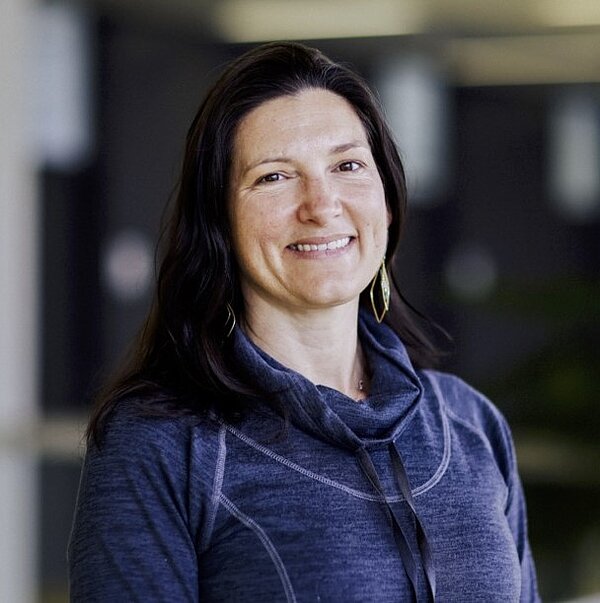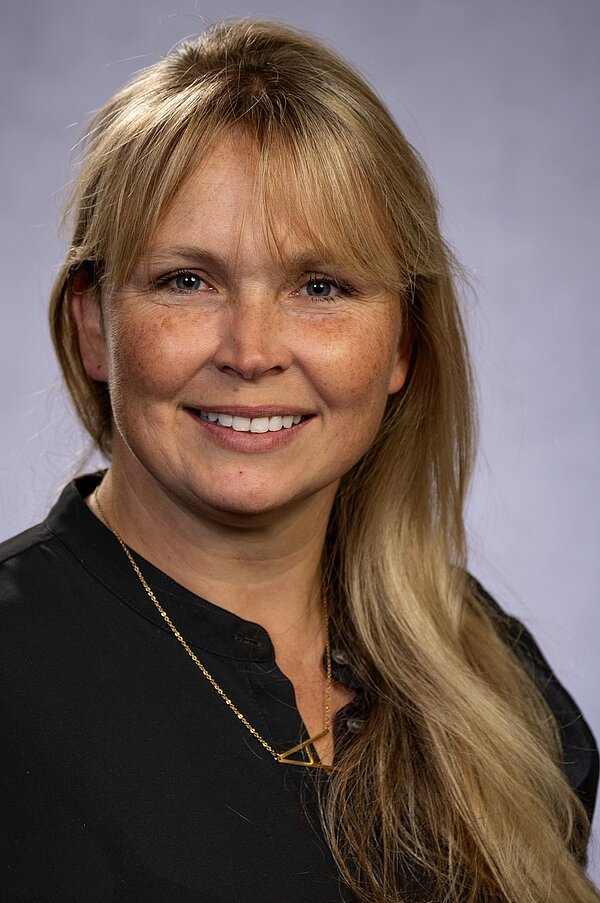Prof. Dr. Lara Ducate
Visiting professor

Lara Ducate was a visiting scholar at the Faculty of Engineering at HTWK in the summer semester 2024. She is a professor at the University of South Carolina in Columbia, South Carolina, USA, and teaches courses on the German language and culture as well as on sustainability and the energy transition in Germany.
What memories do you associate with your time at HTWK Leipzig?
I met many nice, dedicated people at HTWK and learned about many interesting projects.
What excites you about your current job?
I really enjoy teaching my course, "Sustainability, Energy, Climate Protection: International Perspective." It is interesting to teach these topics from a different perspective and hear the students' opinions on them.
What has been one of your greatest professional challenges and how did you overcome it?
My greatest challenge has been and still is figuring out how to "do it all." I want to spend time with my husband and children, have time for myself, and also have a successful career. Sometimes I'm too hard on myself when I feel like I'm neglecting one of these things, but I try to be forgiving with myself and remember that everything balances out.
Who or what has particularly influenced you on your career path?
When I was in high school, I had a very good German teacher. With him and my classmates, I visited Germany for the first time. After that, I wanted to continue studying German, inspire others to learn about different cultures and perspectives, and start my own exchange program for American students. I did all of that. I have also had helpful colleagues in my career, with whom I have worked on many projects, and they have also influenced me.
How important are professional networks to your career?
For me, professional networks have been important for finding partners with whom I could conduct research or develop programs abroad.
What tips or advice would you give young women for their career planning?
Always try to stay in touch with the people you have met during your career and with whom you have worked well. It may happen later that you work with them again or even find other projects or job opportunities.
On what topics can you be approached for questions?
American culture, professional life as a woman
Prof. Dr. Anne Lemnitzer
Visiting professor

Professor Anne Lemnitzer graduated from the HTWK Leipzig in 2004 with a degree in civil engineering, specialising in structural engineering. With a Fulbright Scholarship, she completed her Master's degree in Geotechnical Engineering at California State University, Long Beach from 2004-2005. From 2005-2009, she completed her doctorate in Structural & Earthquake Engineering at the University of California Los Angeles (USA). Since 2011, she has been a professor in the Department of Civil & Environmental Engineering at the University of California, Irvine (USA).
What memories do you have of your time at HTWK Leipzig?
The HTWK provided me with a solid education, in-depth and specialised from day one. Unfortunately, this is not the case in many foreign educational institutions. I particularly benefited from the practical semester, as it effectively combined theory and practice. Professor Slowik was one of the most influential professors during my time at HTWK. He opened up many career paths for me and without his help I would not be in the position I am currently working in. He was and is a professor who really encourages students.
What excites you about your current job?
Working with students keeps me young, and working in research is always interesting, challenging and creative. Especially my work in the field of earthquake engineering is attractive and very relevant in California. I also particularly like projects that promote international cooperation.
What was one of your biggest professional challenges and how did you overcome it?
Participating in a doctoral programme abroad in a foreign language and at the same time studying at one of the best universities in the US was not an easy thing and definitely one of the first challenges of my graduate career. After my appointment as a professor in the UC system in California, you realise the difference between the academic systems on an international level. The requirements and ‘performance expectations’ in the USA are definitely more pronounced than in Germany. You are not simply a ‘civil servant’ there .... This is and remains a major challenge, especially when it comes to professional development, family and children for women at the same time.
Who or what has particularly influenced you on your career path so far?
My father studied at the HTWK, he is also a civil engineer, and has had his own planning office since 1990. As a result, I went to construction sites as a child and helped out in the business. And, of course, a few professors were also instrumental in my professional career: Prof Slowik (HTWK), who encouraged and supported me to do my degree abroad, and my doctoral supervisors Prof John Wallace and Prof Jonathan Stewart (UCLA), from whom I was able to learn a lot, e.g. what good supervision of doctoral students looks like. If you don't enjoy the doctoral programme, you have little chance of keeping that person in academia.
How important are professional networks for your career?
Professional networks are the key to professional success and I cannot emphasise enough how important it is to start building a professional network early on. My national and international contacts and professional friendships are a large part of my success as a scientist and professor and have led to many successful projects and studies. Therefore - even as a student, take initiative, attend conferences, lectures and seminars. You never know who you will meet again and how this acquaintance may develop.
What tips or advice would you give young women for their career planning?
The most important thing is to have a concrete goal in mind. There are many ways to get there, but without a direct goal, even the best GPS system won't help. In addition, there are many people who want to help us along the way and we should not be shy about asking for help. It's in our female nature to ‘have to prove ourselves’, which is healthy, but often an obstacle for women who are talented anyway...
What questions or topics may you be asked about?
Career development, studying abroad and careers at an international level, technical questions in the field of geo-structural engineering (consulting and seminars).